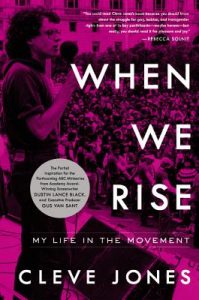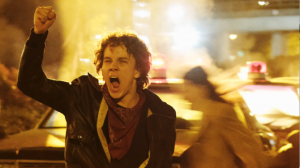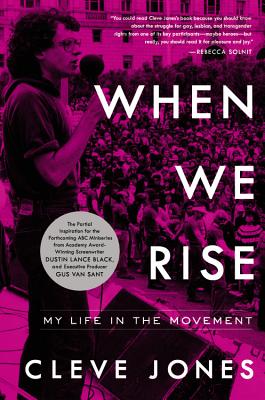When We Rise
ABC
 When We Rise: My Life in the Movement
When We Rise: My Life in the Movement
by Cleve Jones
Hachette Books. 304 pages, $27.
THE EIGHT-PART TV miniseries When We Rise, which aired earlier this year on ABC, documented nearly fifty years of the modern gay rights movement. The docudrama reunited screenwriter Dustin Lance Black and director Gus Van Sant (Drugstore Cowboy, Good Will Hunting) with the intrepid activist Cleve Jones, author of a 2016 memoir of the same title. Van Sant and Black last collaborated on the biopic Milk, which garnered eight Academy Award nominations in 2008, including wins for Best Original Screenplay (for Black) and Best Actor (for Sean Penn in the title role).
In adapting Jones’ book for a mainstream audience, Black was smart to start where the memoir began, with a 1971 issue of Life magazine that bore the title “Homosexuals in Revolt!” Wrote Jones in his memoir: “Everything that was happening, everyone I met, everything I saw led me to believe a revolution was coming.” As a harbinger of that fated uprising, the Life cover story made a late-adolescent Jones (played by the Broadway actor Austin P. McKenzie) feel less freakish and alone while growing up in the Arizona desert with a father who saw his sexual orientation as an illness. Black also built onto Jones’ account by adding two new characters with their own storylines: a gay girl named Roma (played by Emily Skeggs) and Ken, an African-American Vietnam War veteran (Michael K. Williams). (Other eminent cast members include Guy Pearce as Jones and Mary-Louise Parker as Roma in middle age.)
Beyond its bracing pilot, When We Rise follows Cleve, Roma, and Ken as they find themselves and dive into the political fray. In quick succession, Cleve meets with the first openly gay man to address a Democratic National Convention; Roma (clad in a T-shirt that reads “Lavender Menace”) disrupts a National Women’s Conference by shouting “We will not be silent any longer!”; and Ken loosens up and learns to love a drag queen. Black is a skilled storyteller when it comes to breathing new life into history, but he has no sense of humor, and a few episodes in the series begin to drag. Thus it comes as a relief when two comedic talents, Rosie O’Donnell and Whoopi Goldberg, appear in episodes not written by Black. Even the fictional Jones is given some punch lines, commenting on the subject of bathhouses that “I’ve been to one and everyone looked like my Uncle Larry.” But then the series goes into a serious slump when it reenacts the scenes already documented in Milk, including the assassination and its aftermath. Things improve when the series jumps forward to the 1980s and to the genesis of what Jones is best known for, the AIDS Memorial Quilt of 1985.
Toward the end of the series, Jones is energized once again by the homophobic piece of legislation that was California’s Proposition 8. It’s instructive to hear the preposterous arguments that proponents of the bill made before the court, because they already sound like ancient history. Remember the absurd idea that legalizing same-sex marriage would result in a reduction in heterosexual marriage? Contradicting such a canard, Jones delivers this inspiring speech: “This generation has grown up with Ellen DeGeneres and Will and Grace telling them everything is fine. They never felt that sting of discrimination but now that they have, they reacted with anger that stems from self-respect. Why in God’s name would we put a lid on that?” These are wise words from Jones who, like a gay Forrest Gump, keeps popping up in different decades and in different roles: a twink who predates the Twinkie defense; an aggrieved adoptive father (prevented from becoming an orphaned daughter’s custodian because of his HIV status); and, later, a salt-and-pepper pioneer of Pride as we know it today. Driving home the idea that gays and lesbians have come a long way, Roma’s daughter encourages her to marry her other mom, Deanna, which she does. Teary-eyed celebration ensues.

The miniseries When We Rise is that rare instance of a screen adaptation that’s superior to the source material. Jones’ memoir is packed with a lot of on-this-day-in-history factoids and pointless placeholders such as: “When Gerald Ford was sworn in as the nation’s 38the president the day after Nixon resigned, he told the nation, ‘My fellow Americans, our long national nightmare is over.’” More interesting is when Jones drops the pose of a high school history teacher and divulges his romantic and sexual history. A chapter titled “Going to the Tubs” describes his entrée into the bathhouses of 1970s San Francisco; in another he’s being cruised on a train by a French solider named Daniel. These scenes are compelling not only because they’re sexy but because they tell us something we don’t know already.
There’s an amusing bit in the chapter “Making Milk” in which Sean Penn confesses, “You know, Cleve, I don’t really know much about gay people,” to which the author retorts: “But you married Madonna!” A low point comes soon thereafter when Jones quotes Black’s Oscar acceptance speech in its entirety, which reads like a love letter written in response to a love letter: “First off, I have to thank Cleve Jones,” Black begins. In reply, Jones praises Black for “getting right to the point” in his speech, which would seem to refer to—Cleve Jones. I prefer the younger, humbler hero who, stripped of all that pride, describes a visit to Père Lachaise Cemetery in Paris, the final resting place of Jim Morrison and Maria Callas, where he kisses the grave of Saint Oscar Wilde and senses how small he is in the global scheme of things.
Our long national nightmare appears to be over, for now, but who can say for sure in the post-Obama era? The comedian Dave Chappelle’s new stand-up comedy special on Netflix drew criticism for its anti-gay and anti-trans bias, but there are some words of wisdom sprinkled throughout. At one point, Chappelle speaks directly to the gay community, which he claims to know through his wife’s best friends and his houseguests: “I’m telling you as a black dude, I support your movement, but if you want to take some advice from a Negro: pace yourself. Just because they passed a law doesn’t mean they’re going to like you. … Brown versus Board of Education was in 1955. Someone called me a nigger in traffic last Wednesday. It takes a minute!” For this reason, When We Rise is a daring and open-ended title, since it’s not in the past tense and suggests that we may be called to rise again. In the age of what’s been termed Internet “slack-tivism”—America’s youth now think sharing a political post on Facebook constitutes an act of citizenship—this collaborative effort by Van Sant, Black, and Jones is a history lesson that is both lively and timely.
Colin Carman, PhD, teaches British Romanticism and lgbtq studies at Colorado Mesa University in Grand Junction, Colorado.






